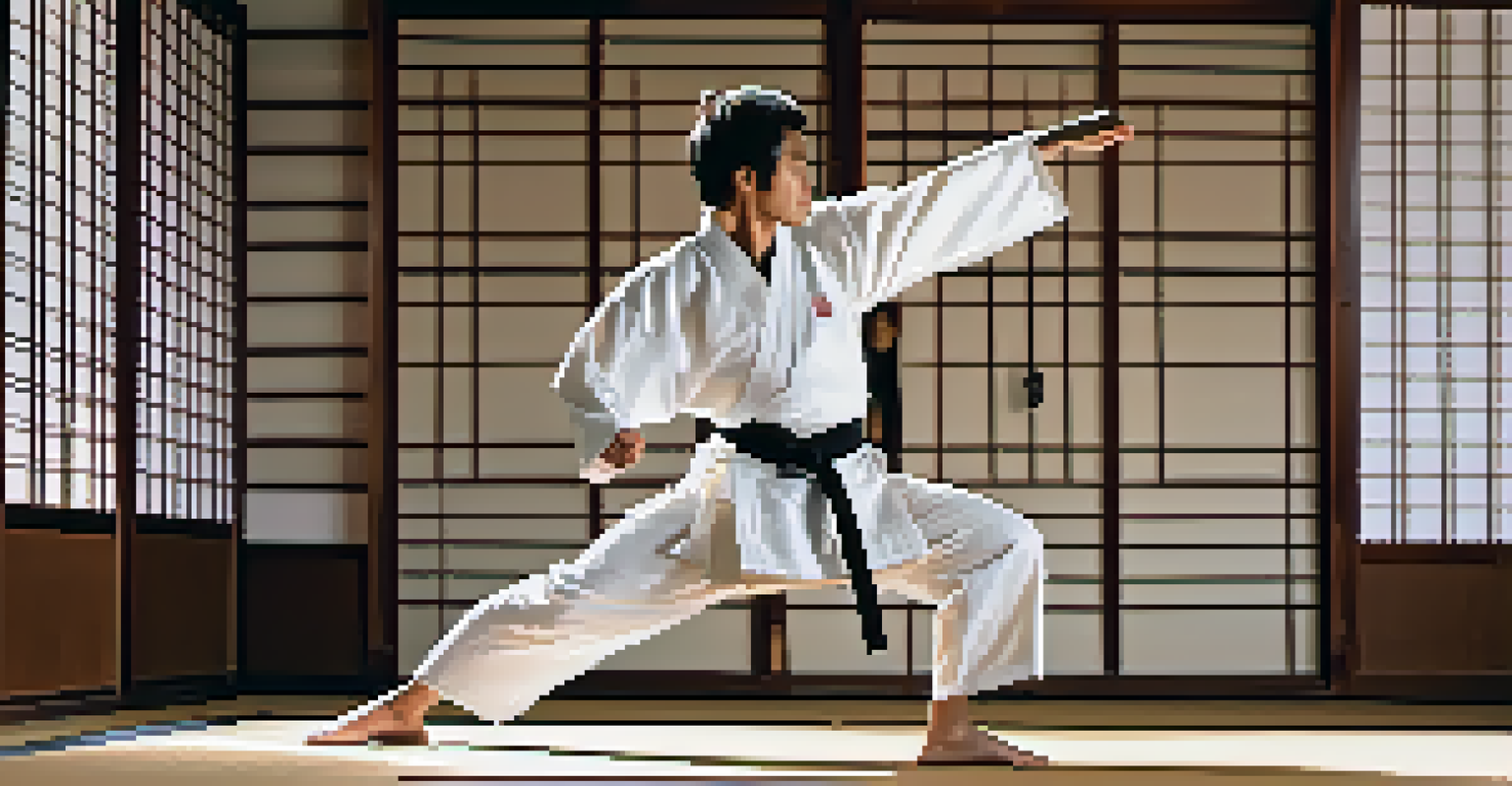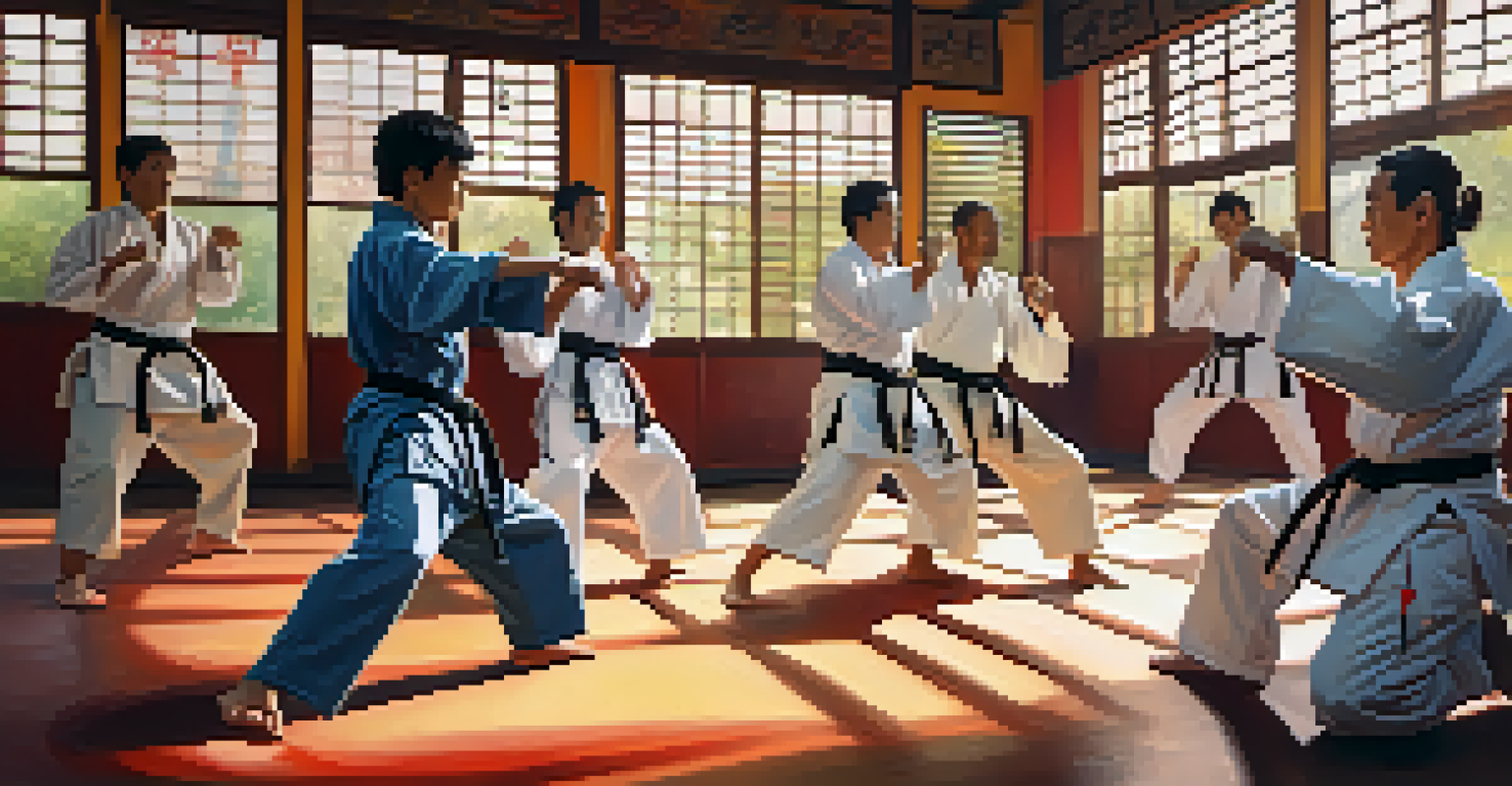Resilience in Martial Arts: Overcoming Challenges and Setbacks

Understanding Resilience: The Heart of Martial Arts
Resilience is often described as the ability to bounce back from adversity. In martial arts, this concept is crucial, as practitioners frequently face physical and mental challenges. Whether it's a difficult training session or a tough competition, resilience helps martial artists push through and grow stronger.
It's not whether you get knocked down, it's whether you get up.
This quality isn't just about enduring hardship; it also involves learning from failures. When a martial artist loses a match or struggles with a technique, they have the opportunity to reflect and improve. By embracing setbacks, they build a stronger foundation for future success.
In essence, resilience in martial arts is about cultivating a mindset that views challenges as stepping stones rather than roadblocks. This perspective not only enhances performance but also fosters personal growth, making resilience a vital component of the martial arts journey.
The Role of Discipline in Building Resilience
Discipline is a cornerstone of martial arts training and plays a significant role in developing resilience. Practitioners must adhere to rigorous training schedules and maintain focus amid distractions. This commitment helps instill a sense of responsibility and perseverance that is invaluable when facing challenges.

Through disciplined practice, martial artists learn to confront their weaknesses directly. For example, if a student struggles with a particular technique, the discipline to practice consistently leads to gradual improvement. This process reinforces the idea that perseverance can lead to mastery.
Resilience Fuels Growth in Martial Arts
Resilience enables martial artists to view challenges as opportunities for growth, fostering both skill development and personal evolution.
Ultimately, the relationship between discipline and resilience is symbiotic. The more disciplined a practitioner becomes, the more resilient they are in overcoming obstacles, creating a powerful cycle that enhances both their martial arts skills and life outside the dojo.
Facing Fear: A Martial Artist's Journey
Fear is a natural response to challenges, but martial arts provide a unique environment to confront and conquer it. Whether it's the fear of getting hurt in sparring or the anxiety of performing in front of a crowd, martial artists learn to harness their fear as a tool for growth. This process often begins with gradual exposure to uncomfortable situations.
The greatest glory in living lies not in never falling, but in rising every time we fall.
For instance, a novice might feel terrified to spar for the first time. However, with guidance and practice, they gradually build confidence and learn to manage that fear. This transformative experience teaches them that fear can be faced head-on, rather than avoided.
Through this journey, martial artists discover that overcoming fear not only enhances their skills but also enriches their lives. The lessons learned in the dojo, such as courage and perseverance, extend far beyond the mat, empowering individuals to tackle challenges in all areas of life.
Learning from Setbacks: The Key to Growth
Setbacks are often viewed negatively, but in martial arts, they are seen as vital learning opportunities. When a student fails to execute a technique correctly or loses a match, the focus shifts to analyzing what went wrong. This reflective practice is essential for growth, as it allows artists to identify areas needing improvement.
Take, for example, the journey of a martial artist who repeatedly fails to perform a specific kick. Instead of giving up, they dissect their approach, seek feedback, and adjust their training regimen. This commitment to learning from setbacks not only enhances their skills but also reinforces the resilience needed to keep progressing.
Discipline Enhances Overcoming Obstacles
The discipline cultivated through consistent training empowers martial artists to confront their weaknesses and build resilience.
In this way, martial arts teaches practitioners that failures are not the end of the road but rather detours that can lead to greater achievements. Embracing setbacks with an open mind fosters a growth mindset, encouraging individuals to persist and ultimately succeed.
Community Support: Strengthening Resilience Together
Martial arts are often practiced in a community setting, which plays a significant role in fostering resilience. The camaraderie among practitioners creates a supportive environment where individuals can share their challenges and triumphs. This sense of belonging boosts morale and encourages members to push through tough times together.
For instance, training alongside fellow students can provide motivation and accountability. When one person struggles, others can offer encouragement, share tips, or simply lend an empathetic ear. This network of support reinforces the idea that challenges are easier to face when you have others by your side.
Ultimately, the community aspect of martial arts enhances resilience, as individuals learn the value of teamwork and shared experiences. By uplifting one another, martial artists create a culture of perseverance that transcends the dojo and impacts their lives outside of training.
Mindfulness and Mental Resilience in Training
Mental resilience is just as important as physical strength in martial arts, and mindfulness practices can significantly enhance this aspect. Techniques such as meditation, breathing exercises, and visualization help practitioners center themselves and develop a strong mental focus. This clarity is essential when navigating the challenges of training and competition.
For example, a martial artist might use visualization before a match to mentally rehearse their techniques and strategies. This preparation not only boosts confidence but also reduces anxiety, allowing them to perform at their best. By incorporating mindfulness into their training, they cultivate a resilient mindset capable of facing any challenge.
Community Support Boosts Resilience
A supportive community in martial arts provides motivation and encouragement, helping individuals face challenges together.
Incorporating these mental practices into martial arts training emphasizes the importance of a holistic approach to resilience. By nurturing both the mind and body, practitioners are better equipped to handle adversity, ultimately leading to a more successful and fulfilling martial arts journey.
The Lifelong Impact of Resilience in Martial Arts
The lessons learned through resilience in martial arts extend far beyond the training mat. As practitioners face and overcome challenges, they develop skills that are applicable to various aspects of life. This adaptability prepares them to tackle obstacles in their personal and professional lives with confidence.
For instance, a martial artist may find that the resilience they cultivated during their training helps them navigate tough situations at work or in relationships. The ability to remain calm under pressure, learn from mistakes, and persist in the face of adversity becomes invaluable life skills.

Ultimately, the lifelong impact of resilience cultivated through martial arts enriches an individual's character and shapes their approach to life. By embracing challenges and setbacks, martial artists not only become better fighters but also more resilient human beings, ready to face whatever life throws their way.